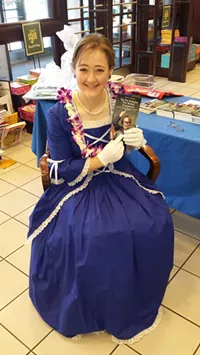Erica Hammon: Strategies for Student Engagement
"If I can go to college, you can go to college"
By Rebecca Frost @josswheelinErica Hammon never pictured herself becoming a teacher. Growing up, she didn't do particularly well in school, and faced obstacles like being diagnosed with diabetes and Graves' disease. Later, she found herself back in a classroom even though she swore she would never set foot in a classroom again. With some prodding, she became the first in her family to go to college—all while raising a family as well. Now a teacher, she wants to spread her message of "If I can go to college, you can go to college" to students who need the inspiration. Her book, Top Ten Strategies for Student Engagement, aims to help teachers inspire and educate their students who need the push, as Hammon did. The book can be purchased on her website, LookListenLearnBooks.com, or from Barnes & Noble—Hammon will be giving a presentation on her strategies at the Sugar House location (1104 E. 2100 South, 801-463-2610) on Saturday, Jan. 17, at 2 p.m., with a book-signing to follow.
Why did you write a book for teachers?
In college, I read this study that said in classrooms, the average is only 17 percent actual learning time, and I was floored. I said, "That is not going to happen in my classroom." Because of that study, I was trying to fight back. We've got to get our kids engaged in the classroom more, and more engaged means more learning time, because engagement correlates with that.
I started writing down the things that I had found that worked really well with the students in my classroom and things I've learned from other teachers as well. There are so many good teachers out there, and so many who don't have the skills and tools that they need to keep their students engaged. It's a huge responsibility to be a teacher, to have these 25 to 30 kids every day and you're responsible for their everything: nurse, mom, educator, big brother, sometimes counselor, sometimes psychologist. I said, "I'm not going to let that happen in my classroom, where my students aren't engaged at least 80 percent to 90 percent of the time," so I started writing down the strategies that turned into 10 that I thought were really important.
How have you accomplished all this? Are you a superhero?
I am not. I'm a normal, everyday person. Last February, I was watching The Secret because, you know, life is tough for everybody in one way or another. In The Secret, it says, "Whatever the mind can conceive, it can achieve," and I believe that. I try to tell my students that every day. One of my goals at the beginning of the year was to speak at UEA, and they accepted me and I did speak at UEA this year. I think my biggest thing is that I have shown my students that whatever the mind can conceive, it can achieve. It's been a hard year; it's been grueling. But I can show my students that anything they can put their mind to, they can do.
Why should teachers pick up your book?
The book is a toolbox for teachers. It's 10 strategies that you can read in an hour and a half. If you give me a thick teacher book, I'm going put it on my shelf. I'm not going to read it until I retire. But if you give me something I can use quickly and effectively, I'm going to read it. That's what my book is. You have 10 strategies you can use tomorrow without any extra preparation. The strategies are quick and easy, and at the end of each chapter, there is a shortened procedure written down. Teachers live by procedures.
What is a strategy people that can use in their daily life to engage others, not just students?
Encouragement. Encourage each other. People can make a huge difference just by the way they treat others. Even with something as small as a smile or a small compliment, it can really encourage others. I think that students often come to school with a lot of baggage. Even having someone say "Good morning" with a smile is a great thing for them. To have someone say, "You can do it, you're smart, you can get through this, you can overcome this," is really helpful.
Do you use your student-engagement strategies with other people, who maybe drift off in conversation?
There are strategies you can use in adult settings. There is a psychologist who bought my book, read it over the weekend, came to me and said her husband read it, too. He is a professor at the U, and he said he is going to use the strategies with his grad students. He says, "I have that row of students in the back of the classroom every week, texting and not paying attention, and I'm going to use the strategy where they come in, sit down and have to get busy with something right away." Some of these strategies really work for college and high school students. Some of these strategies you might have to tweak to make them fit their maturity.
More by Rebecca Frost
-
Sundance Issue 2020
From the street level to the stars!
- Jan 22, 2020
-
Dining Guide 2014-15
Discover nearly 70 ways to fall in love with food
- Feb 1, 2015
-
Allison Carr: Hoping to Get Chance to Try New MS Treatment
Chicago hospital only place using HSCT for MS
- Dec 31, 2014
- More »




